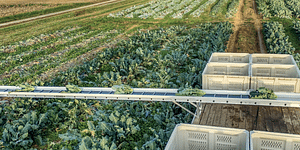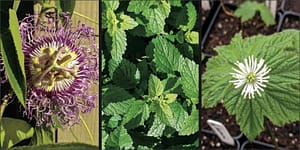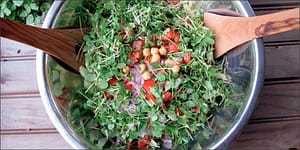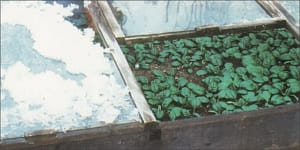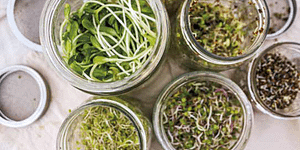What and When to Grow in Containers

If you’re new to container gardening, knowing what and when to sow seeds can feel overwhelming. Never fear! Below is a list of easy seasonal projects plus a rundown of what an entire year of container gardening can look like. Get ready to grow in containers!
The following is an excerpt from The Vertical Veg Guide to Container Gardening by Mark Ridsdill Smith. It has been adapted for the web.
When to Start Growing
Traditionally, the growing season kicks off in early spring. If you’re new to growing, it’s easy to feel under pressure to sow seeds straightaway. But when the weather is cold, the days are short and light levels are low, it’s harder to coax seeds into life and raise healthy plants. It’s much easier in the warm, brighter days of late spring and early summer. Even mid-summer or early autumn is not too late to start. There is, of course, nothing wrong with starting seeds in early spring; just bear in mind that it does get easier later in the year. Ideas for easy seasonal projects can be found in the table below.
A Plan for A Year
January
- Make a plan for the year. Plant new fruit trees. Order seeds.
February
- Prune and repot fruit trees.
- Sow inside: Chillies, peppers and aubergines later in the month (until mid-March).
March
- Sow inside: Tomatoes (best from late March until the end of April).
- Sow outside in early March: Pea and fava shoots, peas (until April) and Jerusalem artichokes.
- Sow outside in late March: Rocket, mustards, radishes, spring onions and coriander.
April
- Sow inside from mid-April: French and runner beans, nasturtiums, courgettes, squash, cucumbers and New Zealand spinach (all until the end of May).
- Sow outside: Potatoes, beetroot, lettuce, parsley, sorrel, chard, kale, spinach, more salad leaves (such as rocket) and Asian leaves like pak choi.
- Divide and repot mint plants. Repot other herbs in larger pots as needed (or next month).
- A good time to start a wormery (any time until July).
May
- Sow inside: Basil.
- Sow outside: More salads and leafy vegetables like chard if needed. A good month to sow most root vegetables, including beetroot, carrots, leeks and radishes.
- Pot up supermarket herbs and stock up on other herb plants (any time until August). Harden off indoor sowings for a week or two.
June
- Sow outside: French and runner beans, cucumbers, courgettes and squash (if not already sown inside); plus, summer salads like New Zealand spinach, summer purslane, nastur- tiums and lettuce.
- Transplant all indoor sowings outside after the last frost (look this up for your area).
- Support climbing plants like tomatoes and squash as they grow and start pinching out the side shoots on vine tomatoes.
- Start liquid feeding fruiting crops once flowering starts (and keep feeding until fruiting stops).
July
- Sow outside: Bulbing fennel for autumn; mustards, rocket and other salad leaves for early autumn; chard and kale for winter.
- A good month to take herb cuttings.
August
- Sow outside: Mooli, Asian greens like choy sum, mustards and pak choi, and salads such as land cress and lamb’s lettuce for autumn and winter. The best month to sow coriander.
- Mulch hungry crops like courgettes and tomatoes with worm compost if you have it.
September
- Sow outside: Rocket, mustards and other fast-growing leaves in the first half of the month.
October
- Sow outside: Last sowing of pea and fava shoots.
- Order bare-root fruit trees for planting over winter.
- Prepare a wormery for winter.
November
- Reflect on the year: What grew well and what you learned, ready for next year.
- Protect winter crops with cloches or horticultural fleece if needed.
December
- Pick the occasional winter salad treat. Sleep and dream.
- French beans are normally sown inside in April or outside later in May or early June.
Recommended Reads
Recent Articles
So you want to start reaping your harvest, but you’re not sure where to start? Learn how to break down the options of harvesting tools!
Read MoreWant to start your own medicinal herb garden? Passionflower, lemon balm, and goldenseal are great places to begin! These herbs are jam-packed with medicinal properties and easy to grow in a majority of climates.
Read MoreDoes the cold weather have you dreaming about fresh greens and colorful salad? Grow and harvest sprouts indoors to make those dreams a reality! Follow this quick start guide to year-round greens for fresh salad greens in just a couple of weeks! The following is an excerpt from Year-Round Indoor Salad Gardening by Peter Burke. It…
Read MoreAre you ready to get a jump-start on the gardening season? With a cold frame, you can get started now. A cold frame harnesses the sun’s heat before it’s warm enough to let unprotected seedlings growing outside. Essentially, it consists of a garden bed surrounded by an angled frame and covered with a pane of…
Read MoreSprouts are easy to cultivate, mature quickly and pack a nutritional punch! You can make nutrient-rich sprouts from all kinds of edible seeds in your kitchen.
Read More






